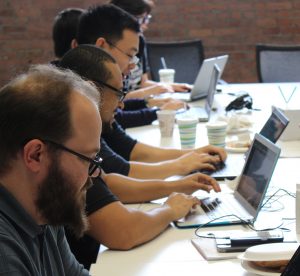The headquarters of IAC Applications, three former factory floors and 40,000 square feet overlooking the Hudson River in Yonkers”™ iPark Hudson, were more quiet than usual on Nov. 3, though not for a lack of activity.
At least half of the 135 employees were teamed up in groups of five or more dedicated to one task. Employees in black T-shirts that read “IAC Applications Hackathon 2016” hunkered over laptops writing code. It was the company”™s inaugural attempt at a hackathon, which drew about 70 participants.
Christopher Phillips, chief technology officer at IAC Applications, said the company was looking for a way to encourage collaboration in the office and kept landing on the idea of a hackathon.
“The idea is to help break down some of those barriers,” he said. “Create more opportunities for interaction with people and focus on solving interesting problems, plus maybe learn some new technologies and get non-technology people involved in the process.”
 The hackathon focused on the workplace collaboration tool Slack. It”™s a corporate messaging app that allows users to create Slack bots, which automate certain tasks for the companies that use it. For the hackathon, IAC Applications employees focused on developing Slack Bots that help internal processes, Phillips said, such as organizing teams and recognizing contributions. He said, for now at least, the hackathon isn”™t intended to develop any new consumer products.
The hackathon focused on the workplace collaboration tool Slack. It”™s a corporate messaging app that allows users to create Slack bots, which automate certain tasks for the companies that use it. For the hackathon, IAC Applications employees focused on developing Slack Bots that help internal processes, Phillips said, such as organizing teams and recognizing contributions. He said, for now at least, the hackathon isn”™t intended to develop any new consumer products.
“It”™s more about, how do we empower teams?” he said.
The hackathon split the 70 people across the company”™s offices in Yonkers, Manhattan, Boulder, Colorado, and Oakland, California, into 15 teams, each tasked with creating its own bot applications. After four days of work, including whatever time employees want to spend on the weekend or after hours on the project, the projects will be judged later this month.
Phillips said he was encouraged by the interest in the company”™s first attempt at a hackathon, especially from people in nontechnology departments such as human resources, operations and communications, and would likely try to schedule another one in the future.
“We”™ll try to learn some things and continue to apply this,” he said. “We”™ll find some sort of cadence or schedule where we can go and make this investment in the future.”
Hackathon has become an increasingly ubiquitous term among technology companies in recent years. Google, Netflix, Amazon and Microsoft are all among tech giants that have hosted similar events for their employees. The concept for Facebook”™s “Like” button started in a hackathon.
The term might conjure up an image from a scene in the 2010 film “The Social Network,” where college-age coders furiously typed at laptops on a circular table and threw back whiskey shots to try to earn an internship with Facebook. But the reality, as seen at IAC Applications office, is a little less wild than the Hollywood version.
Employees don”™t have to stay up all night working or even miss a meeting if they already had one scheduled. The hackathon just allows employees to take time to work on something that is outside of their usual tasks, Phillips said.
But there is food, too. The company ordered 50 egg and cheese sandwiches for breakfast and 12 large pizzas and salad for lunch during its hackathon.
IAC Applications, which formerly was called Mindspark Interactive Network Inc., is a subsidiary of IAC/InterActiveCorp, a media company with more than 150 brands. IAC Applications creates applications for both desktop and mobile devices. Its products for mobile devices, developed under the name Apalon, include a live weather app, calculator and voice and text translator. On desktop, it develops browser add-ons that allow users to find coupons, check the weather and convert files, among other apps.
IAC Applications moved its headquarters from White Plains to Yonkers in 2013, when it moved into the former Otis Elevators Co. complex at 29 Wells Ave. The company”™s neighbors in iPark Hudson includes Kawasaki Rail Car, Inc. and the biotech company ContraFect Corp.
Beyond discovering any new uses for Slack, Phillips said, the company”™s hope for the hackathon is more that it will prove its value in encouraging collaboration throughout the workplace.
“If people walk away having had a good time, worked with a bunch of different people, took a bunch of new challenges and had some level of creativity sparked, then by and large it was a success,” he said.





















